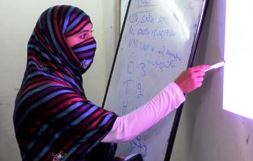 Zahra works with the polio vaccination teams in Nangarhar province27 June 2016 – Zahra (name changed), a polio campaign monitor from Nangarhar province, is one of the heroes of the polio eradication effort, dedicating her work to ensuring that every child receives 2 drops of the polio vaccine during every single campaign round. Her work is not often easy: as a woman in a traditional society where women's mobility is restricted, she faces many challenges as she moves from house to house in remote villages. Women like Zahra are vital for the success of polio eradication efforts around the country.
Zahra works with the polio vaccination teams in Nangarhar province27 June 2016 – Zahra (name changed), a polio campaign monitor from Nangarhar province, is one of the heroes of the polio eradication effort, dedicating her work to ensuring that every child receives 2 drops of the polio vaccine during every single campaign round. Her work is not often easy: as a woman in a traditional society where women's mobility is restricted, she faces many challenges as she moves from house to house in remote villages. Women like Zahra are vital for the success of polio eradication efforts around the country.
During vaccination campaigns, Zahra's days are filled with meetings with coordinators and supervisors and visits to districts where she checks door markings, finger markings and tally sheets to make sure every single child has been reached by the polio teams.
She starts her days early with a visit to the regional Expanded Programme on Immunization (EPI) team’s office where she receives the area visit plan and contacts the relevant area coordinators and supervisors to make plans for the day. Zahra travels to the districts with a vehicle provided by the Ministry of Public Health.
“My job is often not easy but what keeps me going is the goal of ensuring that children are saved from paralysis through vaccination. Every child deserves to be healthy,” Zahra says.
During 4 yearly national immunization days campaigns around 9.4 million Afghan children under 5-years of age are vaccinated against polio with the support of WHO and partners. Over 3 million children are targeted during regular subnational immunization days campaigns by teams going from house to house. Case-response polio vaccination campaigns are conducted in areas with confirmed polio cases.
Before each immunization campaign, Zahra attends trainings conducted by the regional immunization team in Jalalabad in Nangarhar province to refresh her monitoring and coordination skills.
Polio campaign monitoring is important in assessing the quality and impact of immunization activities. Strong monitoring also enables necessary corrections to be made if problems are found during a campaign, for example reaching children who were missed by vaccination teams. Afghanistan has recently revised its intra-campaign monitoring guideline and checklist to make it more user-friendly, with a focus on recording and reporting missed children.
To reach the goal of a polio-free Afghanistan, vaccination teams must reach all children. Zahra plays a key role in convincing parents and caretakers to let vaccinators immunize their children.
“During one campaign I talked to a family who refused to vaccinate their children. I took the issue to our polio team evening review meeting, and the next day I went with the campaign coordinator and doctors to visit the family again. We talked with them for hours, explaining the benefits of vaccination and the dangers of not immunizing children, and eventually they agreed to vaccinate,” Zahra says.
Women are crucial in the fight against polio. Thousands of female vaccinators, coordinators, monitors and social mobilizers work with communities to ensure that all children, everywhere, are immunized. In a traditional society such as Afghanistan, it is often easier for women vaccinators to approach families and get better access to children and mothers.
“If the man in the family refuses to vaccinate their children, I try to contact the mother to convince her,” Zahra says. “Sometimes I face problems but I try my best to overcome them through different ways. I am happy that I can work as part of the effort to stop polio and help Afghan children have a better future.”


